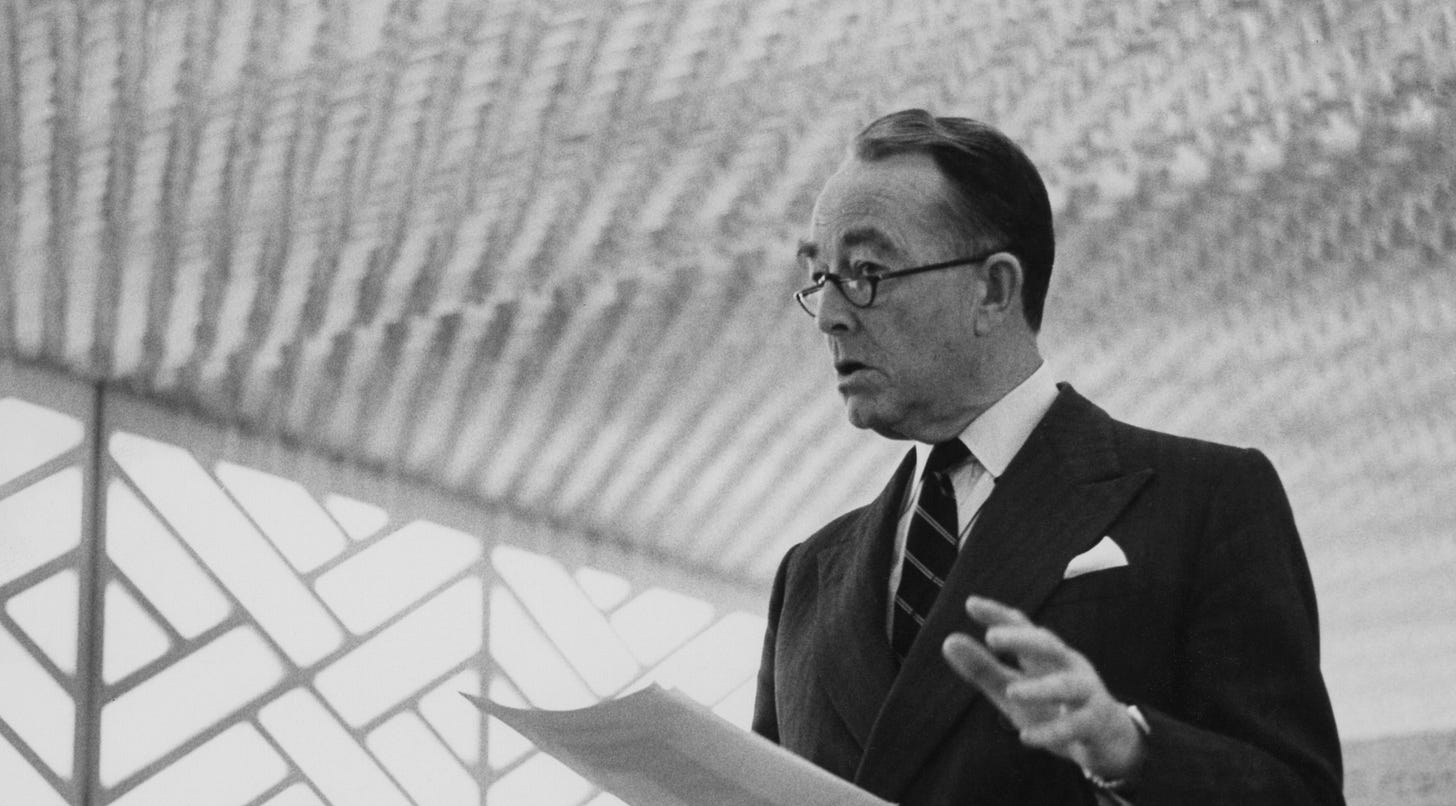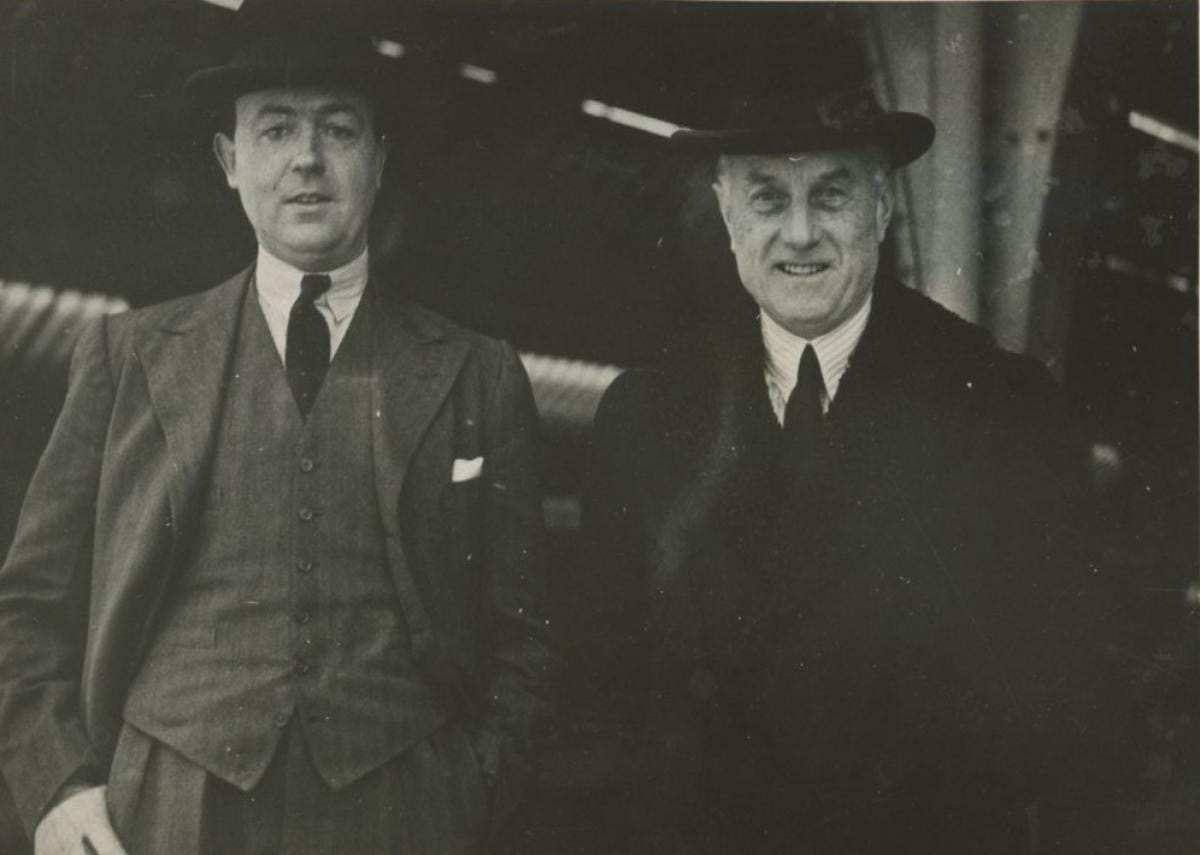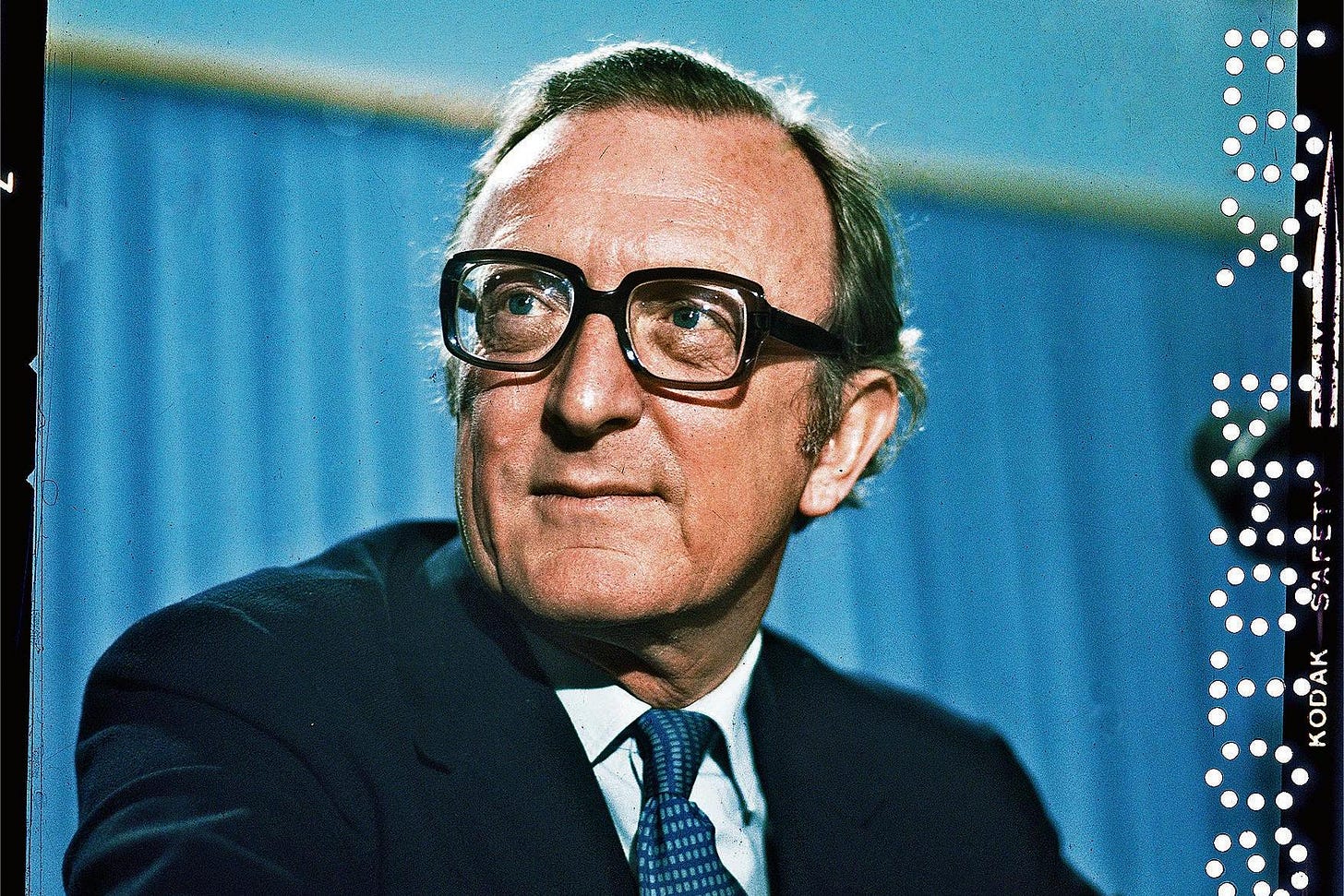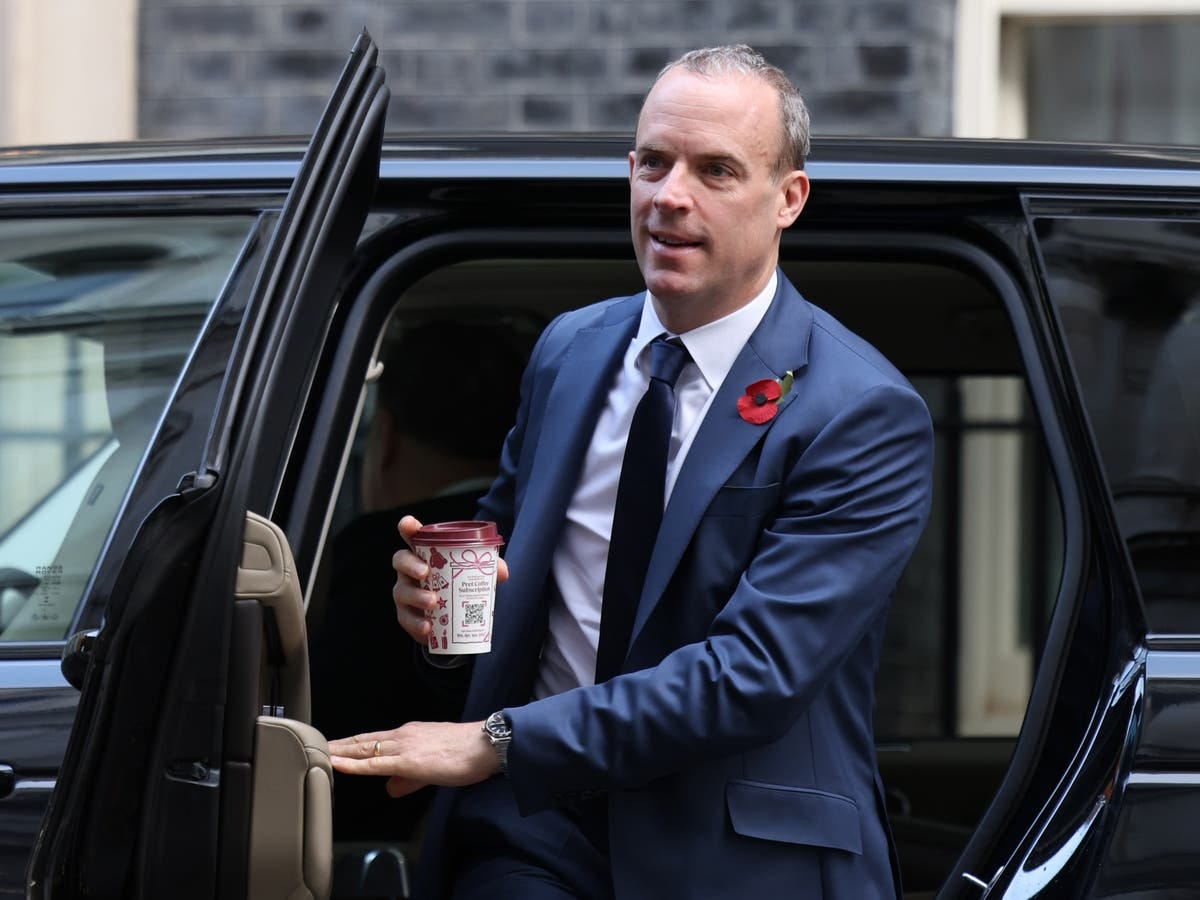"Take a reasonably good law and interpret the common sense all out of it": running the FCDO
Foreign secretary should be a job ideal for lawyers, yet many who achieve the office struggle: an analysis of how good a fit it is
As a profession, lawyers have not always enjoyed the highest reputation, from Dick the Butcher’s gleeful “The first thing we do, let's kill all the lawyers!” in Shakespeare’s Henry VI Part 2 to Professor Niall Ferguson’s mordant observation that “the rule of law in the US is becoming the rule of lawyers”. They are seen as an expensive closed shop, a monopoly of specific learning which binds us all within its rules; and, of course, by definition they are opinions for hire. That is their function.
For all that, it might seem that those with legal training have learned skills which should be particularly useful in the House of Commons. MPs exist, after all, in part to scrutinise draft laws, so a familiarity with the terrain and the argot should be an advantage. More generally, the capacity for hard work, a sharp analytical mind and an ability to speak persuasively ought to be desirable, if not essential, qualities in our elected representatives. Yet the data show that lawyers are finding parliamentary careers less and less attractive. Since the 1970s, the percentage of MPs who were barristers or solicitors hovered steadily around the 15 per cent mark (usually about two-to-one in favour of barristers until the New Labour landslide of 1997, when solicitors started to predominate). At the 2017 general election, though, that figure dropped sharply to 11 per cent, and the decline in numbers has been exemplified by the difficulties which recent governments have faced in filling the law officers’ positions from within the House of Commons.
As far as legal experience in leadership goes, there are good auguries. Since 1900, five of our 26 prime ministers have been lawyers (four barristers and one solicitor), which is around 20 per cent. Moreover they have tended to be eminent: H.H. Asquith, David Lloyd George, Clement Attlee, Margaret Thatcher and Tony Blair, all of whom except the first are regarded as significant and transformational figures. (It is interesting that the exception, Asquith, is the only one who was really accomplished as a lawyer, ably assisting the junior counsel to the Treasury, a senior government lawyer, and taking silk before he was 40.)
In this essay I want to look particularly at the experiences of lawyers as foreign secretary. In many ways it is a cabinet post which suits the legally trained mind, with calm, detailed negotiations of international agreements and a premium on the arts of persuasion. Seven foreign secretaries since 1900 have been lawyers, while the FCO’s chief legal adviser said of another, Robin Cook, that “while not a lawyer, understood the law”. (That is high praise from a lawyer.) This has perhaps become more true since the 1970s, with the growing importance of EEC/EU law from 1973 to 2020 and human rights obligations under the European Convention on Human Rights (the drafting of which was led by a British lawyer, Sir David Maxwell Fyfe). We have also seen the legalistic procedures of the United Nations and the burgeoning of international assemblies and tribunals.
That has been recognised by governments’ use of ministers with legal training. Sir Hartley Shawcross, then attorney general and a brilliantly incisive advocate, was a principal UK delegate to the United Nations’ assemblies from 1945 to 1949; he was seriously considered as Bevin’s replacement at the Foreign Office in 1951. Geoffrey Rippon, who was in charge of negotiating the UK’s accession to the EEC in 1973, was a barrister, and five Foreign Office ministers for Europe from Thatcher onwards have been legally qualified. It is rare for the Foreign Office to introduce legislation to Parliament—excepting statutes relating to Brexit, they tend to be connoisseur’s titbits like the Geneva Conventions and United Nations Personnel (Protocols) Act 2009 or the Cluster Munitions (Prohibitions) Act 2010—so ministers’ legal skills or otherwise are rarely called upon in a parliamentary setting; indeed, the FCO created a seconded post for a procedural adviser drawn from the ranks of Commons and Lords clerks to bolster the department’s expertise on the parliamentary process. But there is a string whiff of the law about the negotiation of international agreements.
There is also a broad legal context to the work of the Foreign Office. As well as its participation in international organisations, it seeks to promote the rule of law, for example by funding the Rule of Law Expertise (ROLE UK) programme which has so far supported legal pro bono work in 20 countries. The most recent systematic assessment of the UK’s international and security policy, 2021’s Integrated Review, refers to promoting the rule of law as one of the government’s “priority actions”, but this is in general a measure of considerable continuity. The distinguished human rights lawyer Professor Murray Hunt regretted that the review had not seized the opportunity for the UK government to seize a “genuine USP on the rule of law”. But it is regrettably axiomatic that when budgets are under pressure, the support for soft power is always an easy victim.
The job of foreign secretary is unlike any other in the cabinet. As I’ve written before, despite its status as a great office of state, the Foreign Office is not always a good springboard for more glorious things, especially the premiership. You can judge my arguments in that earlier piece, but more fundamentally there is something different, something apart, something somehow more elevated about the job of foreign secretary. The cloak of the Diplomatic Service falls around the clothes of its political master, and he or she is seen as slightly above the partisan fray. International affairs are often seen by MPs as graver and more weighty that other areas of policy and it is possible—especially in times of crisis—to achieve bipartisan agreement on issues. For example, even the radical left Michael Foot, leader of the opposition from 1980 to 1983, offered his party’s support to the government after the invasion of the Falkland Islands in 1982, though he and Thatcher approached politics from almost opposite perspectives.
This is why the Foreign Office has been the cabinet position most accepted to be held by a peer. That the departmental chief will not be in the Commons to be questioned is resented slightly less because of the odour of sanctity which hangs around less partisan lords. The last person to hold the job in the upper house was Lord Carrington (1979-82), although the Department for International Development, which grew out of and has now been placed back into the Foreign Office, was run by Lady Amos for a few months in 2003. Before that, the Earl of Home (before he disclaimed his peerage and became the more demotic Sir Alec Douglas-Home) was foreign secretary from 1960 to 1963; the Marquess of Salisbury hoped, not unreasonably, to be given the office when his close friend Anthony Eden became prime minister in 1955; and Viscount Halifax had been foreign secretary from 1938 to 1940 at the darkest time of the Nazi threat to European peace. Looking further back, the Marquess of Reading had served briefly in 1931 and Earl Curzon had been foreign secretary from 1919 to 1924.
Here there is a cautionary note and an apology. I recall an anecdote in a biography I read as a teenager but of which I can find no trace on the internet. So you will have to trust me on this. As I recall, when the Foreign Office changed hands in 1935, the former premier David Lloyd George remarked with feeling “No more lawyers at the FO!” I cannot remember if he said that in June, when Sir John Simon was replaced by Sir Samuel Hoare, or in December, after Hoare had resigned and Anthony Eden was appointed for the first (of three) times. In any event, there had been two legal foreign secretaries in a row—Reading and Simon—and Hoare had been a magistrate, though was not a professional lawyer.
The early 1930s had been a rather grim time for British foreign policy: Hitler was appointed chancellor of Germany in 1933, at the same time as expert and popular opinion in the UK was beginning to think that the country had been too harshly treated by the terms of the Treaty of Versailles. The League of Nations, which had been invested with so much hope after the horrors of the First World War, was clearly failing as an organisation, and British figures had been prominent in its development. Lord Cecil of Chelwood was chairman of the League of Nations Union from 1923 to 1945 and, somewhat peculiarly, had represented the Dominion of South Africa in the league’s Assembly 1920-22; Professor Gilbert Murray, born in Australia but educated in England, was vice-president of the League of Nations Society; and the first secretary-general of the league, from 1920 to 1933, was the Earl of Perth. So the faltering of the organisation was a particularly sharp blow to the UK.
Lord Reading, a very distinguished lawyer and ex-lord chief justice who had also been viceroy of India, was foreign secretary in the first National government in 1931 but resigned within six months due to ill health. He was replaced by Sir John Simon, another eminent barrister. Simon was a peculiar man. Professionally eminent but of modest origins, he had been a Liberal MP since 1906 and a noticeably young law officer under Asquith. Promoted to home secretary, he resigned on principle within a year when conscription was introduced in 1916. Although he was extremely able and diligent, he was impossible to like. His manner was cold, and colleagues were made awkward by his clumsy attempts at mateyness: he asked his cabinet colleagues to call him “Jack” but only one, Jim Thomas, felt able to do so. Neville Chamberlain managed “John” but could go no further. Simon was not trusted either, always being suspected, wrongly, of fierce and ruthless ambition.
His term as foreign secretary, from 1931 to 1935, was regarded as a failure. Addressing the League of Nations General Assembly in December 1932, he did not condemn Japan’s invasion of China with much gusto, and became known with derision as “Man of Manchukuo”. The World Disarmament Conference (1932-34) failed on his watch, though he was not primarily responsible. By 1934, he was attracting criticism from many eminent figures, including Sir Austen Chamberlain, David Lloyd George, Jan Smuts and Winston Churchill. He might have weathered the storm better if he had a reservoir of goodwill upon which he could draw, but there was none. Lloyd George was especially savage, talking about Simon’s “intolerable self-righteousness” and “the slime of hypocrisy”, while Eden described him as having “too penetrating a discernment and too frail a conviction”, as well as being “snaky”. One anonymous critics spoke of him as foreign affairs supremo being “the worst since Æthelred the Unready”.
In June 1935, when Baldwin returned to the premiership, Simon was sent back to the Home Office 20 years after he had first held the job. He was replaced at King Charles Street by Sir Samuel Hoare, a wealthy Conservative who was appropriately MP for Chelsea. Unlike Simon, who was suspected of it, Hoare was unreasonably ambitious. He had been a good secretary of state for India in the early 1930s but was a disastrous foreign secretary. Desperate to address Italy’s invasion of Abyssinia in October, two months later he met his French counterpart, Pierre Laval, in Paris and agreed a secret treaty, the so-called Hoare-Laval Pact, which would buy off Italy with territory in the north of Abyssinia. Haile Selassie’s government in Addis Ababa was not consulted (shades of Munich three years later).
Inevitably the secret pact, which teh cabinet had agreed, leaked to the press in Britain and France. There was international outrage and Hoare’s colleagues turned on him, forcing him to resign. The young and glamorous Anthony Eden succeeded him, but it allowed George V perhaps his only recorded joke: appointing Eden formally, and heavy-handedly referring to his predecessor’s fateful meeting in the French capital, the king quipped “No more coals to Newcastle, no more Hoares to Paris.” For him, it was quite a good joke.
That short period seems to have queered the pitch for legal foreign secretaries. Thereafter, Selwyn Lloyd, Geoffrey Howe, Malcolm Rifkind, Jack Straw and Dominic Raab, lawyers all, would hold the office but they were a mixed bag. The most telling remark directed at Simon, apart from those mentioned above, was, inevitably from the Welsh Wizard, Lloyd George. He allegedly said of the icy lawyer (though it is difficult to prove) that “he has sat on the fence so long that the iron has entered his soul”.
That was in some ways key to the charge that lawyers were unsuitable for the Foreign Office. It is natural for an advocate to consider both sides of the argument, and of course he or she must argue the case he is given, and Lloyd George was not alone in feeling that some lawyers became constitutionally indecisive. While international law and agreements are important, it is vital that the foreign secretary does not become hypnotised by them as sacred texts not lost in minutiae and unable to see the larger picture.
Sir Michael Wood, the FCO’s chief legal adviser between 1999 and 2006, has written of the qualities required in a good foreign secretary. Despite his own background, he does not map the lawyer’s virtues directly on to the political office. He suggests that the foreign secretary must have “readiness to stand up to the Prime Minister”, citing Lord Carrington’s firmness with Thatcher over the settlement of Southern Rhodesia/Zimbabwe in 1980. The secretary of state must also have “energy for constant travel, keeping on top of things and listening to people”, and finally mentions Alec Home as someone who “got on well with people”.
That is not the stereotypical description of a successful litigator. In fact Sir Michael emphasised largely interpersonal skills. This seems to fit with some of the best foreign secretaries of recent times. William Hague, having already served as leader of his party, had no pressure of ambition and could relax in his post. He was confident and at ease, and had the stature to deal on almost equal terms with David Cameron as prime minister. Douglas Hurd, although he had stood for the leadership in 1990, had never regarded the premiership as a likely outcome and was a decade older than his chief, John Major, so again had a degree of detachment; he also had the training of a diplomat, having served in the Foreign Office from 1952 to 1966, including in the UK missions in China, the United States and Italy, so carried the authority of a foreign affairs specialist.
Peter Carrington was one of the most appealing characters of the early Thatcher years. He had first joined government under Churchill in 1951, having previously served with merit in the Grenadier Guards and winning the Military Cross in 1945. Having never been a Member of Parliament, he was not interested in the top job, but he had the confidence and detachment to face up to Thatcher at her most hectoring; they had fearsome rows but maintained mutual respect. (Before the 1979 election, he was asked what would happen to the Conservative Party if Thatcher was run over by a bus. Raising his eyebrows, he replied instantly “Oh, the bus wouldn’t dare.”)
Carrington was in the mould of his Conservative predecessor Alec Home, who was foreign secretary in the House of Lords (1960-63) and then in the Commons (1970-74). Perhaps the nicest man to hold senior office in the British government, he had a disarming line in self-deprecation and a light-hearted persona. This concealed a core of steel: he was diagnosed with spinal tuberculosis in 1940 and, after a major operation, spent two years in a plaster cast around his torso. During his immobility, he read voraciously, not having been an academic student at Christ Church, Oxford, and having scraped by with a third-class degree. At heart he was a countryman, most at ease at his country seat, the Hirsel, outside Coldstream in the Scottish borders.
Home’s lack of reliance on or obsession with politics was a virtue. It gave him assurance and the ability to take risks. He was also widely liked and respected, both within the UK and among international leaders. He was perhaps summed up best by Harold Macmillan in a note to the Queen which endorsed him as the next prime minister.
Lord Home is clearly a man who represents the old governing class at its best... He is not ambitious in the sense of wanting to scheme for power, although not foolish enough to resist honour when it comes to him... He gives that impression by a curious mixture of great courtesy, and even if yielding to pressure, with underlying rigidity on matters of principle. It is interesting that he has proved himself so much liked by men like President Kennedy and Mr Rusk and Mr Gromyko. This is exactly the quality that the class to which he belongs have at their best because they think about the question under discussion and not about themselves.
It should be observed that Dominic Raab, foreign secretary between 2019 and 2021, is the most recent lawyer to hold the office. Indeed, he was not only a lawyer but also, for a few years, an official lawyer in the Foreign Office. He worked on a number of policy areas including the European Union, Gibraltar, the Arab-Israeli relationship and the prosecution of war criminals. One anonymous mandarin spoke of “mixed feelings” at his FCO career, and he was alleged to be difficult to work with and a rather pedestrian drafter. Diplomats I have spoken to have acknowledged that Raab is bright, but “not as bright as he thinks he is”.
Raab was not a success as foreign secretary. In September 2020, the department absorbed the Department for International Development which had been separated by Tony Blair in 1997. The reintegration has not been smooth, with a number of administrative and technical issues, but there has also been widespread criticism of the failure to unite two very different working cultures. Those teething problems, while not wholly Raab’s fault, must be counted against him: a secretary of state must inevitably take responsibility for the organisation of his department.
He also fell down badly in managing the evacuation of UK personnel from Afghanistan in August 2021. Caught by surprise by the speed of the Taliban’s victory and the fall of Kabul, he was on holiday in Crete and returned to London only after a delay. Although politicians can of course work remotely, it was, at the very least, a piece of disastrous public relations to be absent during such a severe crisis. The month after the fall of Kabul, despite wishing to remain in post, he was transferred to the Ministry of Justice by Boris Johnson, though he was compensated with the office of deputy prime minister.
Lloyd George’s visceral hostility to lawyers at the Foreign Office may have been motivated by personal antipathy to holders of the office. But he may have illustrated a wider truth. The qualities which barristers, advocates and solicitors bring to ministerial office, which are considerable, are not peculiarly suited to running the UK’s foreign policy. Instead, it seems, it is a matter of character and soft skills: the foreign secretary must be robust, resilient but also congenial, and clarity of vision is an advantage. Does the current occupant, James Cleverly, have these virtues? Certainly he is not a lawyer, having worked in the private sector and risen to lieutenant-colonel in the Army Reserves. We must wait and see. My view, based on only a little exposure, is that he has a soundness of character and a likeability which may stand him in good stead. No doubt the jury will return eventually.









Another insightful,, erudite and humane essay. I hope in due course they might be published. An excellent inside track on the stuff of government. Many thanks.